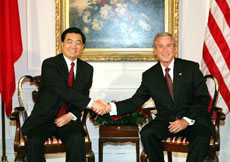The White House has revealed what the United States cares most when President
George W. Bush meets Chinese President Hu Jintao on Thursday: partnership to
deal with world security issues, and a more balanced bilateral trade
relationship.

Chinese President Hu
Jintao (L) shakes hands with US President George W. Bush in New York in
this September 13, 2005 file photo.
[Xinhua] |
Bush will ask his Chinese counterpart
to step up pressure on both Iran and North Korea to help end nuclear standoffs,
and also, will bring up the topic that China needs to move faster on its
currency, the Associated Press report quoted senior administration officials as
saying on Monday.
In discussing Iran, Bush will raise China's role as a permanent member of the
United Nations Security Council when the two leaders meet at the White House,
said Dennis Wilder, a National Security Council official who overseas Asian
affairs.
Bush will emphasize "that we need the Iranian government
to assume a more responsible posture in relations to its nuclear ambitions,"
Wilder told a White House briefing to preview Hu's visit. The U.N. Security
Council has demanded that Iran cease uranium enrichment work, which the United
States and some of its allies suspect is meant to produce weapons. Russia and
China have opposed punishing Iran.
President Hu was to be in Seattle on Tuesday.
"We will also be urging China to help us get the North Koreans to return to
the six-party talks ... so that the people on the Korean peninsula have a future
that's free from nuclear weapons," Wilder said.
Separately, Deputy Secretary of State Robert Zoellick said Chinese officials
"need to be more than a mediator" in the negotiations, which had been held in
Beijing until the current 6-month-long deadlock began. "They need to be a
participant that recognizes that they have an interest in trying to solve this
problem," Zoellick told a foreign policy forum.
An informal gathering last week in Tokyo of the six countries involved in
talks to get North Korea to give up its nuclear program failed to produce a
breakthrough in the stalled negotiations.
Zoellick also said China was
saying the right things about wanting to more fully open its currency, the yuan,
to market forces. "But the process of change seems agonizingly slow," he said.
Another senior administration official told White House reporters that, while
Bush would raise the currency issue with President Hu, the administration did
not expect any concessions on it from the Chinese leader at Thursday's meeting.
The official spoke on condition of anonymity because he was not authorized to
speak publicly on the matter, the Associated Press reported.
Meanwhile, Senate Democratic Leader Harry Reid of Nevada asserted that, more
than five years into Bush's presidency, the administration "still has no
coherent strategy for managing this nation's relationship with China."
In
a letter to the president, Reid urged Bush to do more to protect U.S. economic
and trade interests with China, and to ask Beijing to do more to improve human
rights.
Dennis Wilder said Taiwan and China's defense policy would also be on the
agenda.
"There is no auto pilot in U.S.-China relations, but relations have matured
to the point where neither is this a terribly unusual meeting," Wilder
said.